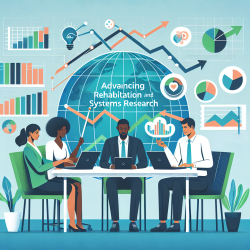Introduction
The field of rehabilitation has undergone significant transformation over the past few decades, expanding its scope beyond preventive and curative care to optimize functioning and reduce disability. According to recent estimates, approximately 2.41 billion people worldwide could benefit from rehabilitation services, a number that has likely increased due to the COVID-19 pandemic. Despite this growing need, many individuals, especially in low- and middle-income countries, still lack access to necessary rehabilitation services.
The Role of Health Policy and Systems Research (HPSR)
Health Policy and Systems Research (HPSR) plays a crucial role in understanding and improving how societies organize themselves to achieve collective health goals. It is an interdisciplinary field, incorporating elements of economics, sociology, anthropology, political science, law, public health, and epidemiology. This comprehensive approach helps elucidate how health systems respond to and adapt to health policies, as well as how these policies can shape and be shaped by broader determinants of health.
For rehabilitation, HPSR generates the evidence needed by policymakers to make informed decisions and develop action plans that enhance the capacity of health systems to serve populations in need. The evidence provided by HPSR can help:
- Establish priorities for rehabilitation service delivery
- Evaluate outcomes of various rehabilitation interventions
- Identify societal benefits justifying these decisions
- Strengthen health systems to increase access, quality, and provision of rehabilitation services
Global Initiatives and Partnerships
In 2022, the World Health Organization (WHO) established the World Rehabilitation Alliance (WRA) to strengthen networks and partnerships advocating for the integration of rehabilitation into health systems. The WRA's mission is to support the implementation of the Rehabilitation 2030 Initiative through advocacy activities. Its workstreams focus on workforce, primary care, emergencies, external relations, and research, with a strong emphasis on generating and utilizing HPSR evidence for planning and integrating rehabilitation into health systems.
Call to Action for Practitioners
As practitioners in the field of rehabilitation, it is essential to engage with and contribute to the growing body of HPSR evidence. By doing so, you can help shape policies and practices that improve access to and quality of rehabilitation services. Here are some steps you can take:
- Stay informed about the latest research and developments in HPSR for rehabilitation.
- Collaborate with researchers and policymakers to contribute to evidence-based policy development.
- Advocate for the integration of rehabilitation into health systems at local, national, and global levels.
- Participate in professional networks and alliances, such as the WRA, to strengthen advocacy efforts.
Conclusion
The importance of health policy and systems research for strengthening rehabilitation in health systems cannot be overstated. By leveraging the evidence generated by HPSR, we can ensure that rehabilitation services are accessible and effective for all who need them. Practitioners have a vital role to play in this process, and by engaging with HPSR, they can help drive meaningful change in the field of rehabilitation.
To read the original research paper, please follow this link: The importance of health policy and systems research for strengthening rehabilitation in health systems: a call to action to accelerate progress.










